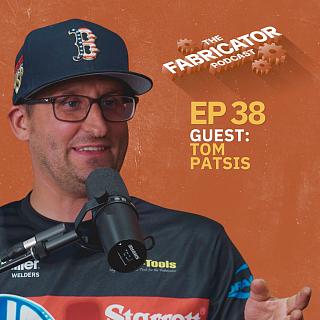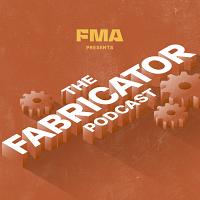Winning and fabricating trophies with Tom Patsis of Cold Hard Art
Tom Patsis of Cold Hard Art joins the podcast to talk about the never-ending business of designing, fabricating, and building trophies for motorsports events.
Tom sits down with hosts Josh Welton and Dan Davis at FABTECH 2023 in Chicago, and opens up about how he left his job at Don Schumacher Racing as a fabricator to start his own business, as well as the pros and cons of starting a small business.
He also talks about winning the first season of Metal Shop Masters on Netflix and partnering with companies like Miller Electric, Starrett, FastCut CNC, PFERD North America, Trick-Tools, and others.
Tom also discusses running a business with his wife, being father, the rewards of being a metal artist, and how he would fabricate an alien space craft.
Email us at podcast@fmamfg.org with any comments, questions, or suggestions.
In This Episode
Learn more about the FMA's most recent industry surveys.
Learn more about the 2024 FMA Annual Meeting.
Check out ASTM International
Follow Aaron Prather on LinkedIn
ABOUT THE FABRICATOR PODCAST
The Fabricator Podcast brings you conversations with people in manufacturing who make things out of metal. We speak with manufacturers, metal fabricators, welders, job shop owners, small business entrepreneurs, artists, marketers, educators, and more. Host Dan Davis also goes beyond discussing just manufacturing and the skilled trades, and chats about pop culture, current events, food, music, movies, comedy, and, of course, robots. The Fabricator Podcast is presented by the Fabricators & Manufacturers Association.
Host: Dan Davis
Producer/Editor: Gareth Sleger
Video Producer/Editor: Brandon Geier
Ad writer/spokesperson/social media: Sara Spring
Additional video editing: Dana Wiker
Graphics: Billy Kulpa
Marketing support: Elizabeth Gavin, Mary Diamond
Sales support: Andy Flando, Amy Hudson
Web support: Mike Owens, Jared Carlow
Additional support: Ed Youdell, Maurine Semevolos, Lincoln Brunner, Tim Heston, Rafael Guerrero, Josh Welton, Darla Welton, Amanda Carlson-Hicks, Callie Check, Rick Lehnhardt, Judy Steinbach.
Where to listen to The Fabricator Podcast:
Follow The FABRICATOR:
- YouTube
TRANSCRIPT
Tom Patsis: Let's just throw the dice down and see if it works. I gave my Schumacher racing job and the fab shop, which is an ideal job for anybody who likes building stuff. You get to build 330 mile on race cars, and you have big budgets and you get to do all this stuff, and you get to see it on TV. It's a really fun job. And either I'm the stupidest person alive, quitting an awesome job...
Josh Welton: Or, "I'm brilliant."
Tom Patsis: Or I'm brilliant, which I don't know about that.
Sara Spring: Navigate your leadership journey at the FMA Annual Meeting, February 27th to the 29th in Clearwater, Florida. At this premier event, you'll connect with top leaders in the fabrication industry to share ideas, collaborate to solve business challenges, and build strategic relationships. Chart your course for success in 2024 and beyond at the FMA Annual Meeting. Find all the details at fmamfg.org.
Dan Davis: I'm Dan Davis with The Fabricator magazine and this is my host for today, Josh Welton.
Josh Welton: Hello.
Dan Davis: You might know him from his contributions to The Fabricator and fabricator.com as well as his many online endeavors.
Josh Welton: That's right.
Dan Davis: Today's guest is Tom Patsis of Cold Hard Art. Josh knows him pretty well. When did you first cross paths with him?
Josh Welton: We crossed paths online a little bit and knew right away we hated each other. Then, they put us together. Bill Elverman, who in that time worked in marketing for Miller, was like, "Hey, you want to come do an interview?" I can't remember at first if it was like he was going to interview us. Then we got there and we're like, "We'll just talk to each other." I thought he was going to cut it down to a two-minute bit, and we just talked 15 minutes stream of consciousness and he put the whole thing online. Tom, he's hilarious. We're able to bounce things off each other. And he's a high, high energy dude. No filter. To see where he came from with his art to where he is at now, the journey, and then how he took the jump doing it part-time and then getting into just doing art full-time is really something that I've admired.
Dan Davis: And something we didn't cover early in the interview is that he actually won that Metal Masters contest that's now available on Netflix, if you haven't seen it.
Josh Welton: A controversial victory, but...
Dan Davis: With that in mind, with the rapport that you have with our guest, I'm going to let you sit in this seat.
Josh Welton: Sounds good.
Dan Davis: There you go.
Gareth Sleger: The ship is sinking.
Dan Davis: All right. Buckle up and enjoy this episode with Tom Patsis.
Sara Spring: Now available from FMA are two comprehensive industry related surveys for 2023. The salary, wage and benefit survey for Intel to help company owners and HR managers, as well as the financial ratios and operational benchmarking survey for crucial business performance data. Visit fmamfg.org to download both annual surveys. And now, back to the episode.
Dan Davis: Welcome back to The Fabricator podcast. I'm Dan Davis. Today, we have Tom Patsis of Cold Hard Art. That's right?
Tom Patsis: That is correct, sir.
Dan Davis: Okay. I have a tendency to mess that up. And then Josh Welton, he's been here before. We're doing this live at Fabtech.
Josh Welton: Hell, yeah.
Dan Davis: Tom actually helped us out early on in the creation of The Fabricator podcast in what we call The Lost Episode. The test run.
Gareth Sleger: Yeah, that never aired. It was at an MSE show in Novi.
Josh Welton: Just a coincidence that Tom was on it. And that disappeared, never to see the light of day.
Tom Patsis: It's probably best for everybody.
Josh Welton: It probably is.
Tom Patsis: I see why you didn't show up.
Dan Davis: Were you both there?
Josh Welton: That's a good question.
Tom Patsis: No.
Josh Welton: No. I was supposed to moderate it. I was supposed to be the host or something. Then I got called for work out to Dugway, Utah, which is like Area 52. I mean, I was basically dissecting aliens for work and I just can't really talk about too many of the details, but I couldn't-
Dan Davis: You just admitted to dissecting an alien. That is the detail.
Tom Patsis: Wait. Space aliens?
Josh Welton: I mean, who hasn't dissected an alien?
Dan Davis: We're accepting that now?
Josh Welton: Yeah, that's just fact now.
Dan Davis: Okay. So literally, just today as we're taping this, there's a press conference in Mexico where they actually rolled out a body of supposedly an alien. That's in some Mexican morgue.
Tom Patsis: Really?
Josh Welton: But yeah.
Dan Davis: I mean, kid you not. Look it up on a Twitter machine. It's there.
Josh Welton: I don't even think it's a question anymore. Aliens are real, right? Or-
Tom Patsis: I'm looking at one right now. I mean, I'm looking at him.
Dan Davis: Oh yeah, mummified alien corpse. See?
Josh Welton: I'm not a corpse yet. Oh, you're talking about-
Tom Patsis: It just took a devious turn right in like minute one.
Dan Davis: There you go. ABC7. I mean, that's a legitimate news floor.
Gareth Sleger: Sorry, Tom. We're going to have to switch gears here.
Josh Welton: Who has to strangled an alien to death after they crash-landed in your backyard?
Dan Davis: It kind of looks like those JFK autopsy photos.
Josh Welton: It's definitely not fake.
Dan Davis: That's I was going to say.
Josh Welton: That doctor looks legitimate.
Tom Patsis: Seriously, if they're that small, I'm not afraid of them.
Dan Davis: Yeah. Somebody put on-
Tom Patsis: That's a giant otter.
Dan Davis: ... Twitter and he goes, "If that's the aliens, good luck trying to tackle Derrick Henry." Are you sure that's not just like an old ET statue that someone buried?
Josh Welton: I don't know.
Tom Patsis: No, that's metal. That's some piece of mache.
Josh Welton: That's paper mache.
Dan Davis: I'm talking to two metal artists right now. I'd like to commission a statue of this mummified alien.
Tom Patsis: I mean, look how legit it is. It's got the flag up and... Man, I see cookies. I see everything.
Josh Welton: Listen, just because you set up cameras and mics in a background doesn't mean it's legit. Look at us.
Tom Patsis: I mean, they had two cameras there.
Dan Davis: It doesn't?
Josh Welton: Yeah. The news was talking about it. Like, channel seven.
Dan Davis: Yeah. It's legit, man.
Tom Patsis: Okay.
Josh Welton: Don't rain on my parade right now.
Tom Patsis: So, we're in a fabricating show here, right?
Gareth Sleger: Tom is trying to reign us in now.
Tom Patsis: We're, I think, trying fabricate.
Josh Welton: You know it's bad when Tom's doing the reigning in.
Tom Patsis: So, there's metal and welding going on somewhere?
Josh Welton: Yeah. What have you been up to lately, Tom, in your shop in Indianapolis?
Tom Patsis: A lot of trophies.
Josh Welton: Lot of trophies.
Tom Patsis: I've turned into a trophy business, which is not bad. I get to build and weld stuff, but it's one of those accidental blessings, I guess, because art sells. About selling art, sometimes it's tricky. But trophies have just snowballed. When I leave here tonight because we'll drive back to Indianapolis, I have 60 something trophies to build in, I don't know, five, six days.
Josh Welton: Wow.
Tom Patsis: It sounds like a lot but it's not going to be terrible. But then after that, I still have a bunch of other choices because we're going to go on vacation finally and go to Florida for a week with my wife Amanda and Luna and stuff. So, we're actually going to not weld for one day. It's going to be quite nice.
Josh Welton: That's weird.
Tom Patsis: Not that welding's terrible, but there's days when you don't-
Josh Welton: It's nice to have a break.
Tom Patsis: Yeah, a little bit.
Josh Welton: Every time, I... Back in the day, we were texting each other at three in the morning, you're still making stuff. I've gotten busy doing other things and you went full-time into your own business, and it's been awesome to watch you grow that. I have a lot of admiration for what you've done. Just rough guess, unless Amanda's totally kept track of it, how many trophies do you think you've done?
Tom Patsis: That's a good... I mean, it's in the thousands now obviously.
Josh Welton: Oh, easily.
Tom Patsis: I honestly don't... I'm at that point now that I'm 41 and not young.
Josh Welton: That's pretty old.
Tom Patsis: Instantly, my memory has like, "I remember building that for that guy's name." You remember that guy's name? The first customer? I don't remember anything anymore. So someone will bring and like, "Hey, I bought this from you nine years ago." And you're like, "I made that?"
Josh Welton: Exactly.
Tom Patsis: Not just because you got better at what you do but going, "I don't remember that." And that's going... I don't even do drugs. You know what I'm saying? I don't drink. I don't do anything. I'm not that excited of a person. But I go, "I don't remember that at all." And it's-
Josh Welton: Oh, does protest too much?
Tom Patsis: Yeah, I think it's a five-year-old daughter that's probably-
Josh Welton: Yeah, a little bit.
Tom Patsis: ... breaking me down internally. So yeah, it's probably got to be a thousand something plus. Just this year, I probably already made... I started the year making 35 replica NHRA championship trophies from last year. And that happens every year after you make the first four for the winners. Replica trophies are good business because if you do good work-
Josh Welton: They'll come back.
Tom Patsis: ... they'll come back to you next year. And if you do good work, you do the championship trophy, then you go with the race winning trophies. And then... Like NHRA as an example, I used to work in NHRA as a crew guy, and one of the teams trying to get these trophies and now I get to build them. So, that's really cool. But now, they trust us with all their specialty events. And it's like, "Holy crap." So, we've get-
Josh Welton: Yeah, you're doing legit, large-
Tom Patsis: Yeah, big sanctioning bodies and-
Josh Welton: ... national- Yeah. How did you, coming from that industry, help you get a foot in the door as far as gaining that business?
Tom Patsis: I think it's because I was in that sport or racing and you make friends with all the sponsors that are on the vehicles that you're racing with. And you become like this, you just become that intimate, get to meet them and know people, know their families, and then you text them and then social media helps. And then it snowballs into, "Hey. I hear you're doing this metal art thing and not working. Would you like to do ours or do you need a sponsor?" Or, "You could use our product," because of social media. Again, it's always social media and marketing. So, it's all just very organic and just natural. And I'm a people-person, so...
Josh Welton: It's a good space for you. I was just talking to Amanda about your shirts. That's obviously Motorsports-inspired. Not a lot of people can pull it off, but you can, and the people who... The one or two people who like you can also do that. Tom and I have a love-hate relationship.
Tom Patsis: Yes, we do.
Dan Davis: So, who did the artwork for the logo?
Tom Patsis: It's a place in across the street from me in Brownsburg called Six Six Graphics, and they do a lot of the Motorsport uniforms and shirts-
Josh Welton: Oh, wow.
Tom Patsis: ... and stuff like that. Obviously-
Josh Welton: They're right next to you, right?
Tom Patsis: Yeah. I'm looking out, our window into their front window.
Dan Davis: That's cool.
Tom Patsis: In Brownsburg, you have a lot of vendors and supplies. My metal is at SR... I mean, all this stuff's on my shirt, SRI has all my steel. And then obviously, Miller. And all the people that we do a lot of them are-
Josh Welton: That's great.
Tom Patsis: A lot of them are located in the area and some are outside, like up in Appleton.
Josh Welton: The Cold Hard Art logo, is that something they did or you did?
Tom Patsis: No, that's actually something I had a buddy draw in Motorsports. He's a photographer, Taco Patterson. He's a guy that just draws graphics on the side. And I said, "Draw me a circle logo," because you can put a circle anywhere.
Josh Welton: Right.
Tom Patsis: If it's a square, it doesn't always fit. And you have to put it straight. Circle, you can put it on an angle and it just looks cool. And I wanted the lightning holes and it looks like a pair of dial calipers, so it has an inspiring thing. And the colors, obviously I like blue, but my favorite driver as a kid was Greg Moore. He was Indy Car driver and he had the player sponsored Foresight Indy Car. It was dark blue, light blue, and white. So I go, "Oh, I'm going to put that in there because that just looks cool. And I like blue, anyway." And then it just corresponds with blue and Miller and it just works out. I like color combos that match, so it's...
Dan Davis: It is like-
Josh Welton: Red, white, and blue.
Dan Davis: Yeah.
Tom Patsis: Everything is race inspired somehow.
Dan Davis: It's a little unique amongst all the other logoed polos and T-shirts.
Tom Patsis: It sticks. Definitely when you see it on a race car, because blue is a happy color, it definitely stands out.
Dan Davis: What size do your trophies range typically?
Tom Patsis: What's your budget? That's basically-
Dan Davis: You're asking the right guy.
Tom Patsis: I always start... I go, "What's your budget? When's your due date? Do you have any graphics?" And stuff like that. And just, "Do you have a design?" And usually, it's just anything when you want to give them the best. This is one thing that I've had to explain to some people. When you get marketing companies and they're... I don't want to say this. I've dealt with this a couple of times where I sometimes tell them. I go, "I'm on your side. Don't think of me as somebody on the other side that you have to compete with because I want to give you the best that you want." Right?
Dan Davis: Absolutely.
Josh Welton: Right.
Tom Patsis: I want it to match your brand. I want it to give you everything you want. So, don't think of me as the guy that you're arguing with or going... I may sound like I'm arguing, but I'm just trying to get all the information out of you so I can be up at three o'clock in the morning building this not having to bother you.
Josh Welton: Right.
Tom Patsis: So remember, I'm on your side.
Josh Welton: And then there's no miscommunication because there's often that.
Tom Patsis: No, yeah.
Josh Welton: They assume something, you assume something, and you're getting it all sorted out from the beginning. How did you rolling into using different materials for your trophies? You've used a bunch of different stuff now.
Tom Patsis: Yeah. Obviously, I'm a welder and I makes up a steel, but I gotten into a different color acrylics because you can light up that stuff. As a trophy builder... It's kind of weird saying that. I like to make my stuff better than my old stuff, and I like to make my stuff better than other people's stuff. I mean, it's a competitive side.
Josh Welton: That's right.
Tom Patsis: Like if you and me had a running race to that door, I would shove you out of the way. Even if you'd beat me, I'd still want to find a way to win. So, same with trophies. I'm not here to make you faster, I'm just here to make my stuff known that it's there.
Josh Welton: Absolutely.
Tom Patsis: Basically-
Josh Welton: It stands out. The pieces are incredible.
Tom Patsis: I know metal art isn't really a competition with trophies and stuff. To me, it is. If you and me built something, I want to build it better. I want people to go, "Man, look at that. Look at that." And that's just, I can't turn that off sometimes. So sometimes it drives my wife crazy and things, but it's one of those things. Just, it's internal.
Josh Welton: I always feel like that. Every piece I do, I'm trying to just be better than the last piece I did. At some point, you start competing with yourself because everyone develops their own style. Once you find that language, you found that language for your work, people look at it and they know that you did it. It's yours. My buddy, Max Brandy, used to tell me, "Art is about..." You're creating your own language. And then if somebody comes on after that, everyone knows they're speaking your language. They might be doing really well at it, but it's your language that they took. I think once you develop that style, you're almost then competing with yourself. Obviously, you got another person making trophies, you want to kick his ass. But ultimately, I think to me anyways, it seems like that you want the bar to be set by yourself and then just keep pushing it up and up and up.
Tom Patsis: Yeah, you really... Honestly, with social media, you can go follow other people that probably do similar stuff. And I do follow a lot of people, but I try my hardest not to get worked up about. Because sometimes you see stuff and I won't say people copy you, but you go... And I had a buddy that works at Hendrick and he tells me-
Josh Welton: It's a thin line between inspiration and theft.
Tom Patsis: Yeah. He just go, "You know what? It's okay." It's okay because they go... Now, he's got to do it again. And again and again and again. So, he told me. He said, "Don't get bitter, just get better." It's a simple thing and sometimes it's like, "Dang. He's old and wise and... Okay, I need to listen to him. And it makes sense." Because someday, what you and me say may inspire younger people to do the same thing. So, that's how we all get better is then somebody 30 years from now is going to be just blowing us out of the water going, "Hey, that's cool man." Like, "Hey, you inspired me." And I go, "That's a real customer."
Josh Welton: Yeah. That's the best feeling in the world when you see after... I mean, we're... I'm older than you, but we've been doing this for a while in this space when it started with us. Before, there was a lot of some old guy in his garage would be making stuff but it was really simple to a pattern, and he'd tell like, "Here's bike number 703." And if you want bike 703, the websites were really boring and... Like with us, our whole career has been online, so you can go back and see where we started to where we are now. And there wasn't a space for that then. And now, there's so many really incredible people in it, and now we get... I used to always get like, "How do you make your tires? How do you make your wheels?" I'm sure you get the same thing.
Tom Patsis: Yep.
Josh Welton: And it's like, "I make them a bunch of different ways and I'm not going to tell you how to make yours because you need to discover your style."
Tom Patsis: Absolutely.
Josh Welton: And two people at the same time did that and I gave them the same answer, and they were both pissed. Then I went and looked at their stuff months later, and they came up with a way to do it different than how I did it, and now it was theirs. They developed it, they came up with that idea, and it's a hundred percent... I inspired them but they had to do it how they could do it.
Tom Patsis: I feel like that's the thing my wife knows. She goes, "Look at this over here." And I go, "It's all good because I didn't tell him how to do it. He figured it himself." And I said, "No one told me how to do..." When I make certain things that makes me happy to make, that's what makes your art separate from someone else's. And I go, "I'm not going to tell you not because I'm an a-hole but because no one told me and I figured it out, and I've mastered it in my way. You need to do the same thing, so you come up with your own style."
Dan Davis: You think that's made you all better welders?
Josh Welton: A hundred percent.
Tom Patsis: I think... I hate to say Instagram, social media, but I think it's made younger people not just intrigued in welding but it's made them better because they don't see their uncle who maybe, like you said, welds once a month going, "Hey, that looks really cool," and he's fixing his mini bike or something. And it looks like crap and he goes, "Oh, that's that what it's supposed to look like?" Now, you see all these amazing welders. And you go, "Oh, that's what it's supposed to look like." So it gives you that instant, "I know I need to be here if I really want to tell people I'm a good welder." So, social media is really good for that.
Josh Welton: Into the 2000s where there wasn't really social media. There was but it's in infancy. You had message boards. You go-
Tom Patsis: Yeah. Or geo cities.
Josh Welton: You go all to the different message boards and it would be the same two guys posting pictures of welds that look similar. It's like, this is really cool but everyone else... Some people are saying, "Oh, machine did that. Or this and that." But it was... I can't even... England was one of them and there was another one, and it was just two guys on all the different message boards posting about these welds that they did. And now, I think people were doing that kind of thing but it's really easy to get stuck in a niche in this industry. And you've worked... I have somebody say, "I've done this for 40 years, and what you're doing is impossible." It's like, you've done what you do for 40 years in a little isolated shop. There's this big world out there. And that's the thing with social media, is iron sharpens iron. And now, you can look at somebody from Israel, from Russia, from the UK, and see what they're doing and bring elements of that into what you do.
Tom Patsis: Yeah. Like patchwork. You can have a really pretty quilt but it's from 19 different things going, "Wow, it looks a lot better than just one piece of cloth." Like you said, you get exposed to things that you would never get exposed to. It's also good and bad because then, sometimes you go, "Man, I'll never be that good." And some people take that and go run back downhill with it. Some people go and become amazing. You're going, "I remember when you could even weld. And now, how did you do that?" "Well, I saw this guy," or YouTube videos or whatever. I mean, there's a lot of information. Sometimes, there's too much information, but...
Josh Welton: We're getting people that... Because we've done it for so long. I've had people who are like, "Hey, I was ready to quit," and didn't want to weld anymore, and then didn't realize that there's this whole other... Like just laying patterns on a flat piece of metal, you can create art out of that. And to me, that's the best feeling you can get. But now, you've given somebody another option for going forward in their life that some... Like, Dabs has turned it into... He's the master now. He's so good at what he does. And I remember him telling me. He is like, "I was just done and then I saw what you do and I was like, 'I'll give that a shot.'" And now, he's... The student becomes the master. He's just taken it to levels that I never would've imagined.
Dan Davis: Did either of you all get tempted to maybe try to do the influencer thing and try to make that a full-time gig?
Josh Welton: I didn't. No. I'm sure with Tom running his own business, that's kind of part and parcel.
Dan Davis: Like and part of the marketing.
Josh Welton: Dude, I'm sorry. I'm saying doing a full-time.
Dan Davis: Yeah. Like every day, new video or something.
Josh Welton: I was always, right from the beginning, I had rules in my head as far as like, I wasn't going to spam people. I wasn't going to... I wanted to work with companies that I already used their products.
Dan Davis: Right.
Josh Welton: But I was in a position where I wasn't making income from that.
Dan Davis: So, it was more of a community instead of trying to profit from it.
Josh Welton: Yeah, to an extent. But when I would find a company... We both are sponsored by Miller. They're good people. It's almost like a family atmosphere and they've always treated us really, really well. And the same thing with some of the other sponsors that I have, and with Tom too, like fast cut. Just blew onto the scene and Russ is awesome to work with. And basically, our mission is just to make stuff that looks cool with their machines, and he's opened up so many possibilities to what we do by just like, "Hey, I'm going to support you, guys." As far as influencer goes, Tom is definitely more of an influencer than I am because he's got that-
Tom Patsis: I don't even-
Josh Welton: But you don't try. You're just-
Tom Patsis: I don't even like the word influencer-
Dan Davis: I don't even like it either.
Josh Welton: I don't even-
Tom Patsis: ... because the reason, I feel like it's a word you use in closed doors.
Dan Davis: I love when people-
Josh Welton: I guess they would, influencer, and they whisper it like -
Tom Patsis: Yeah. Now, it's like influence and it's a tagline on... I just-
Josh Welton: You don't see it as a career.
Tom Patsis: I feel like it's... I'm at the shop making products and I'm, yes, using products that obviously helps me make money and it can help you make money, too. So I like the idea of going... I think you get it if I'm showing you an abrasive, I'm going, "Obviously, I don't like to..." I'm the worst salesman with stuff. I'll be going, "If you don't need it, you don't need it." You know what I'm saying? But this is what you have. I use it. If you want to use it, cool. If not, I'm like the guy that goes, "You know what? I don't think it's for you. Maybe you should try this one or this." Or even with my own art, I tell people who are like, "Oh, I'm going to spend $10,000." I'm like, "For what you're asking, you only need to spend five." And my theory is everybody that goes, "Man, we were under budget on that project," use that guy again. I would rather get $5,000 from you for the next 20 years than $10,000 once and you never come back.
Dan Davis: I think that's at the heart of good art is authenticity, whether it'll be something creative for the internet or some... Just metal art.
Josh Welton: I've turned people to Tom in the past because they asked for a certain thing and I'm like, "You know what? It's not something that I'm really into, but Tom does this really well. Talk to him." And everyone has their space, and I want the people coming in looking for pieces. Send them to the right person, send them to the person who's going to do the best job of it. Unless there's other parts of that maybe you want the challenge. But I know that Tom excels in this area, I'm going to push that person to Tom because he's the man.
Tom Patsis: Yeah. Oh, Dan. You're here. How are you doing?
Dan Davis: Good. How's it going?
Tom Patsis: We're not trying to displace you at all. What do you-
Dan Davis: No. Let's go back.
Josh Welton: Let's justify your job, Dan. How's your day going?
Dan Davis: There you go. Well, here he goes. This is where the professional comes in. So, since we were talking about aliens earlier, if you had to design a spaceship, would it be more like the traditional round or the cigar-shaped people claim they see?
Tom Patsis: It would be-
Dan Davis: We actually had it. We were talking about an orb-shaped-
Josh Welton: The Tic Tacs.
Dan Davis: ... UFO that one of my coworkers had watched.
Josh Welton: Tic Tacs.
Dan Davis: Do you have a preference in alien ship style?
Tom Patsis: My spaceship would be covered in stickers and there would be some... It wouldn't even hold aliens. It would hold half an alien.
Dan Davis: Is it going to be racing-inspired with giant bucket seats?
Tom Patsis: It'd be carbon fiber and it would be all titanium. It'd probably look like the SR-71. It'd probably look like something that. It would have to be faster than Josh's, is the only answer I have for you. Josh's would be like-
Josh Welton: You need more firepower than mine, too, then.
Tom Patsis: No. Yours would be like a Skylark Buick or something.
Dan Davis: Josh's is going to be big and bulky, right?
Tom Patsis: It'd just be smoking. Just Studebaker, bullet nose, ugly looking thing. Just poop, poop, poop. And the alien be like, "Hey man, I need some more gas." And he'll be like, "Oh, you running gas?" I feel like I'm the adult here.
Josh Welton: I know.
Tom Patsis: I feel like I'm... So Dan, how was your day? I feel like, "Oh, I'm sitting here." Like, I'm interviewing you two guys.
Josh Welton: Sure.
Dan Davis: Let me ask you this.
Josh Welton: Do you believe in aliens?
Tom Patsis: No. I don't know what I believe in anymore. You know what I'm saying? After the last couple of years, I've seen so much crazy. I go... I mean, I don't know what... I don't know know. I don't know what to tell you. I don't not believe. I look at it going, you're going to tell me this little baby rock that we're on and there's bigger rocks out in the world, and then there's more rocks and there's more. I go, "How-"
Josh Welton: Dude, when the images from the new satellite popped, that they threw into-
Tom Patsis: Oh, yeah.
Dan Davis: What's the web?
Gareth Sleger: James Webb.
Josh Welton: James Webb?
Dan Davis: Yeah.
Tom Patsis: Yeah.
Josh Welton: That's incredible.
Tom Patsis: You're going to tell us we're the only somewhat intelligent people here? And I mean you and me, no one else knows.
Josh Welton: Specifically in this room. Good choice.
Tom Patsis: You know there's more fab shows in other galaxies that they're talking about.
Josh Welton: They're probably lit, too. They're just doing crazy shit.
Tom Patsis: Yeah. They're taking-
Dan Davis: So think about this, what if there's a parallel reality where you're sitting over there and he's over here. You make the trophies and he's the fabricator personality.
Josh Welton: I'd probably jump off a roof. I hope there's a lot of gravity on that planet. That's all I got to say.
Tom Patsis: You can't say that on radio.
Josh Welton: We're not on radio.
Tom Patsis: We can say anything we want.
Josh Welton: It is radio. Hold on, this is the caller in portion.
Dan Davis: It's WFAB Chicago.
Josh Welton: Caller Greg from Elkhart.
Tom Patsis: Great question. We'll stay on the line. We'll get you a T-shirt.
Dan Davis: Josh, how do you make those wheels? Don't be a dick. Tell me how you make them. Do you have a blueprint?
Tom Patsis: That was Dan's real voice too, actually.
Josh Welton: Finally, he shows his real side.
Dan Davis: I'm going to hang up in it and listen for my answer now.
Tom Patsis: He takes helium to bring his voice up.
Dan Davis: Hey, Josh. Long time listener, first time caller. Listen to too much AM radio. I apologize.
Josh Welton: How long have you been in the space you're in right now?
Tom Patsis: Are we still talking about space like on planet Earth?
Josh Welton: It's appropriate for interpretation. Like, your shop space.
Dan Davis: That's an awesome segue, by the way.
Tom Patsis: My shop space? We've been there for five years because the reason I know that is because... No, it was more than five years because Amanda was pregnant with Luna in her belly and she was operating the forklift. And she wasn't allowed to lift anything, clearly. I had to load everything and it took us 28 days, and our shop is only maybe an eighth mile behind our shop. It's all in the same property. We moved from one rental spot to another up front, and it took us 28 days. It's amazing how-
Josh Welton: Twenty-eight days later.
Tom Patsis: ... your friends disappear when it's time to move heavy stuff.
Dan Davis: That's how you know you're getting older.
Tom Patsis: Yeah, or all were just like... We got really-
Dan Davis: We're not taking a call anymore.
Tom Patsis: We got good friends but they're like, "We're not moving on Super Bowl Sunday up to our third floor. We're using a forklift." Radio silent. You know what I'm saying? All my friends are going to hate me now, but it's fine. I'm buying new ones. And the idea that moving from there to there was going to be... It took 28 days, five cans of propane, and my forklift. It was just like, we're here and everybody goes, "You're going to need a bigger shop." I'm like, "You shut your mouth because we're never moving."
Josh Welton: Not today, Satan.
Tom Patsis: Or I hate to say this, tornado will pick the place up, take it away, and it will just rain spark plugs and ball bearings for the next three weeks or something after that storm. That's the way I plan to go out. We're a big crater where I welded on something wrong.
Josh Welton: At what point did you decide that you needed to be organized?
Tom Patsis: I haven't, no. I haven't figured that out yet.
Josh Welton: But you've got the shelves with the bolts and the stuff?
Tom Patsis: It's not bad. It's not really bad organized. I mean, it is a lot of blue Lowes buckets.
Josh Welton: I mean, most of my time when I'm doing a sculpture is trying to find metal stuff.
Tom Patsis: Yeah, that is something... I mean, I'm pretty quick at doing stuff because I do know where everything's at. And you walk in and my shop does look like a 12-year-old designed it. There's race car stuff everywhere-
Josh Welton: It's awesome.
Tom Patsis: ... models. I mean, it looks... I get it. I'm 41, probably should maybe get a sweater or something. But I feel like this is how I'm going to be found dead someday, with just Dickies on.
Josh Welton: When you moved into new space, did you try to recreate what you had in the old space? Just more space in between?
Tom Patsis: No. You know how it is when you put stuff where you put it, and then you realize I shouldn't put it there but you don't have time to change it? And then you get more stuff like a plasma table, that takes up a lot of space. And I have this nice Kaiser air compressor, a screw compressor. I'm like, "Yeah." I bought it last year, haven't even plugged it in yet because I haven't had time to either put the three-phase in against the wall. And then that whole process is the plasma table's got to move, this has got to get put in, the wiring's got to put in, and I don't have time to unplug my plasma table because I need it every day.
Josh Welton: Right.
Tom Patsis: So it's that whole, "Maybe Christmas day I'll go in the shop and work, and work on... No, I guess not."
Josh Welton: I'll come help you.
Tom Patsis: Not saying no. So maybe not Christmas day.
Josh Welton: A voice from beyond said, "Hell, no."
Tom Patsis: At maybe Luna's birthday or some day that doesn't really isn't very important that I could get in there and just work. You know what I'm saying?
Josh Welton: I can give you a hand, although I might just be sabotaging things secretly.
Tom Patsis: My wedding anniversary. You could be. I think you're sabotaging me that question now. My wife's looking at me.
Josh Welton: Probably.
Tom Patsis: We're not working those days, so we did good. What else? Dan, give me another question. Give me something.
Dan Davis: Let's see what can we do here.
Tom Patsis: Give me another question.
Dan Davis: What planet would you like to visit if your alien friends came to pick you up?
Tom Patsis: Obviously, a part of-
Josh Welton: You're assuming he has alien friends.
Dan Davis: Pretty much at this point, I believe him.
Tom Patsis: I think Pluto, because I think Pluto got that bad rep. They'd taken the name from a... I'd rather go there and go, "Look, it is a planet." And then you know what guy-
Josh Welton: Put your flag down and name it Planet Pluto.
Tom Patsis: Yeah, Planet Patsis. It has a real name now. You know what I'm saying?
Dan Davis: There's something beyond there. I'm sure we can get that slapped on some orbital body.
Tom Patsis: Yeah. It would just 220 plugs everywhere, UPS stores, just things that I need every day. That would be the only thing you'd have. Pringles chips and some Mountain Dew or something.
Josh Welton: All of a sudden, clones of you start popping up everywhere and it's like, "Hi, I'm Tom." "Hi, I'm Tom." "Hi, I'm Tom."
Tom Patsis: And just saying stupid stuff all the time?
Josh Welton: And you don't even know who you are so then you just have to have a mass...
Tom Patsis: It'd be like literally where my own self would turn against me and say, "Oh, the user's bad."
Dan Davis: Oh, it's face off. That would be a good move.
Tom Patsis: Or face off, yeah. But those are good-looking guys.
Dan Davis: Face off in space.
Josh Welton: We're going to start working on, "We want to do a documentary movie." I don't know if it should give out the idea, but I guess if somebody else takes it.
Tom Patsis: So if you want to sponsor that, just listen to our plan and call us later.
Josh Welton: Yes. We're looking for funding, but you explain it.
Tom Patsis: All right. It'd be the idea of going to go find metal artists and go see them in their natural habitat and stuff like that. I think the biggest part of it would be me and him in some Dodge product driving down to Texas, driving down to Montana or whatever. And so, it'd be part journey and then meeting somebody and going, "This is right."
Josh Welton: And we'd just be talking shit the whole time on our drives.
Tom Patsis: Yeah. I'd be like, "Hey, would it be cool if I was cooler than you?" And he'd punch me and we'd be all jacked up on whatever his favorite energy drink would be at the time. I think it could be fun because it would be like half-exploring, half-interviewing.
Dan Davis: I'm not a movie executive, but you might want to sharpen that plot presentation a bit.
Tom Patsis: You think so?
Josh Welton: It's brand new, so-
Tom Patsis: I thought that was the trailer right here.
Josh Welton: That was pretty concise, yeah. I don't know.
Tom Patsis: That was the trailer.
Josh Welton: You know what, guys-
Dan Davis: I don't want to speak for Hollywood. I apologize.
Josh Welton: I think Dan's off his rocker on that one.
Dan Davis: Yes, I apologize.
Tom Patsis: I mean, the thing is all-
Dan Davis: Who am I to judge?
Tom Patsis: Yeah.
Josh Welton: Who are you to judge?
Dan Davis: After all my success in Hollywood.
Josh Welton: So, how much...
Dan Davis: Here we go.
Josh Welton: Obviously, we've talked to a lot of people in this show. Particular, we're at Fabtech 2023, and there's a lot of husband and wife teams. How critical is Amanda to what you... I mean, I think that you probably wouldn't exist if not for her, so...
Tom Patsis: You know you can't do this by yourself.
Josh Welton: No.
Tom Patsis: I mean, unless you're a billionaire... This is my joke-
Josh Welton: You're still not doing it yourself without people doing it for you.
Tom Patsis: No, I'm not but I go- Listen. Bill Gates can't keep his wife. I'm doing a good job. My wife's still there. She's still got a smile on her face and I make only probably 50% of what he makes.
Josh Welton: Exactly.
Tom Patsis: So clearly, I'm doing a good job.
Josh Welton: It's probably the looks.
Tom Patsis: I mean, I drive like an '03 Chevy Silverado. It's a step off.
Josh Welton: Yeah, it's balling.
Tom Patsis: Yeah, it's got a leaky transportation-
Dan Davis: It's vintage now.
Tom Patsis: My wife is a boss. She does the civil duties of an adult. All the emails, shipping, taxes, all the stuff that I shouldn't be attached to because it would be canceled the minute. But she's a good helper. She's a very... I could not do this by myself because I would be in my shop for 29 hours out of the day, never take a shower, I'll probably never eat. All those-
Josh Welton: Sounds about right.
Tom Patsis: ... things that I would never. She keeps me grounded.
Josh Welton: Have you started breaking child labor laws yet with Luna?
Tom Patsis: Oh yeah. Luna's doing all kinds of work in the shop that most adults shouldn't be doing. She's learned how to ride a bike.
Josh Welton: She get into those small spaces.
Tom Patsis: Yeah, she can. She can grab all that dirty stuff underneath the welder that no one wants to grab. She does. She's really good at taking spark plugs out of boxes by the thousands. She knows what side to take the spark plug out to be the quickest.
Josh Welton: Anybody know the number to CPS, Child Protective Services, for those who-
Tom Patsis: I thought it was coolparents.com is what you're talking about. I don't know. That's my only answer. My wife's great and my lawyer tells me to say that. Yeah, she's good.
Josh Welton: She's happy right now.
Tom Patsis: I look at and what's the most common thing someone says to her when they meet her after? "Oh Tom, he's cool." They go, "How the hell do you do it?" They look at her-
Josh Welton: Hundred percent all the time.
Tom Patsis: ... "You must have a hell of a drinking problem." And she doesn't. She don't drink at all. She's naturally operating-
Josh Welton: It's magic. Maybe she's an alien.
Tom Patsis: She has to be. She does have colored hair, so that could be something. I love you.
Dan Davis: Has your daughter welded?
Tom Patsis: No. Right now, she does have her own welding helmet that I had pinstriped, so that's cool. And she's also got one, too. But right now, it's only carts that she's allowed to touch, and that makes my wife-
Josh Welton: Got you.
Tom Patsis: Let me just tell you about that. Let me tell you about the most scariest thing I've ever done. I've jumped out of an airplane, I've been in a car crash, I got married. All those scary things that you can do, right? But letting my daughter drive a cart where she has control, 100% control of 50% throttle, I've never been so afraid of mine. And she did the perfect job. She did everything I told her. She did a circle stop, did it and did everything right. And after they left the shop, went home, I took an hour and a half nap because my internal spirit was so stressed out. I mean, I've never felt fear like that. I could do public speaking in front of 10,000 people naked and it wouldn't give me a quarter of the fear that I had that day.
Josh Welton: Other people might have a bad day. That's awesome.
Tom Patsis: Yeah, that might be not something for other people. But I go, it was the most nerve wracking day. So, that's as far as she's got but she's a little five-year-old that knows everything. She actually knows everything. When I say that, I'm not gloating that she's a-
Josh Welton: Right.
Tom Patsis: She will say, "Hey, that pilot, Jake, is flying that plane again." I'm like, "What?" Oh, there's a plane. And then, "I know that dude's tag," because she's got super vision. It says, Jack Smith or something. I'm going, "She's always right," and I have never been wrong, and I'm surrounded by females. I got a dog, a cat, my wife, my daughter.
Josh Welton: That's the car she drove around in.
Tom Patsis: Yeah, there you go. That's the one, yeah.
Josh Welton: Sweet.
Tom Patsis: It will potentially do 30 miles an hour. Right now, the throttle is set to 12.
Josh Welton: Is that a safety rated helmet?
Tom Patsis: No, that one isn't. She has her own helmet. Her helmet costs more than about a thousand bucks. Her helmet costs more than the car, but at least it looks cool because Amanda's mom, June, painted it for her. And it looks really nice. It's really cool. When she wins her second or third Indy 500, we can have that memento. "Your grandma painted your first helmet."
Josh Welton: I like that. I'm looking at that Audi in the back.
Tom Patsis: Yeah, that's the Audi I was talking about. That was-
Josh Welton: What's the scoop behind that?
Tom Patsis: That's not in my shop. That's in my buddy's shop.
Josh Welton: I got you.
Tom Patsis: And my little buddy, Christian, is loaning because when he was five, he raced that go-kart.
Dan Davis: That's awesome.
Tom Patsis: So, it's got tradition to it. Maybe someday, that'll go to somebody else who's whatever-
Josh Welton: What circuit is that Audi being raced in?
Tom Patsis: What's that?
Josh Welton: What circuit is that?
Tom Patsis: That's like that old, rich, dude sport where they all just get at Watkins Glen and just... I got a bigger than you-
Josh Welton: That's fine.
Tom Patsis: And that's my couple million dollar race car that was raced in Le Mans in '02.
Dan Davis: Oh, wow.
Josh Welton: You just say it and we'll beep it out.
Tom Patsis: Okay. It's a race car.
Josh Welton: Race car.
Dan Davis: Beep.
Tom Patsis: I got a bigger race car than you, so yeah. So like I said, our whole area that we're in is race car central. My old DSR drag racing work is across the street, so I look at that every day. It's kind of like bumping your old ex-girlfriend in the apartment and you go, "What's up girl?" And keep on going your way because your wife's right behind you. Stuff like that. That's my rocking chair. It's out of a Porsche or something, I don't know.
Josh Welton: That's awesome.
Tom Patsis: Whatever.
Dan Davis: Do you feel like you're missing out on other types of fabricating because you're now doing all these trophies?
Tom Patsis: I mean, I do a lot of TIG and MIG. I really have no interest in stick welding just because I know there's a lot of work that goes with that and you're out in the field somewhere. I go, "I am cool sitting on my table." And if it's not of AC, it's still hot. I mean, it still gets ninety degrees in my shop. But I just always like TIG welding because... I don't know. I joked that it's like the fine tip sharpie. And then you got MIG welding, it's like a bigger marker. And then obviously, for what I do and being so small, it's really the only thing a MIG welding's-
Josh Welton: It's a great technical explanation.
Tom Patsis: MIG welding is great when you're doing a hundred different trophies. But TIG welding for the little things, it's just... I got to get small. I even got some baby torches that have a really small-
Josh Welton: No kidding, huh?
Tom Patsis: ... that I got from Mark Zone. There's CK stuff and they're really the stuff that you can get into with that. I think it's meant for building headers. And when you're welding, those that collected together and you got to get that part inside that's insanely small and you can't hang your tungsten out, you use this little baby. It's like quarter inch diameter cup on it.
Josh Welton: Oh yeah. Those things are... I lose them. I pick them up and drop them like, "I guess, I'm not using that today."
Dan Davis: I don't think Darla's wearing a welding torch earrings now.
Josh Welton: Yeah. She's got the tiny welding torch earrings.
Tom Patsis: You got to live the lifestyle, baby. You got to live the lifestyle.
Josh Welton: Even... I mean-
Tom Patsis: Commit to the part.
Josh Welton: Now, they are welding now, so they need their equipment.
Tom Patsis: Don't forget, please, either. They got a place in this world. What else you got? Come on. Don't slow down on me.
Josh Welton: The MIG you do, is it a short arc or do you use pulse at all?
Tom Patsis: You'd be amazed. I look like an amateur. I got my... What is it? My Miller 250. It's got a sticker on it now.
Josh Welton: Is it 252 or 255?
Tom Patsis: 252. It's 252 and I set it at my O35 and I just go... It looks like eight inch. I said it that. I'm not this... I'm not going to be able to tell you wire speed and heat ranges and all this stuff. I used to set it eighth inch steel is my go-to on everything when it comes to trophies because it's just thick enough to be heavy duty and not bend.
Josh Welton: No, it's a good size.
Tom Patsis: And it's be able to manipulate it and it's not too heavy, and I obviously cut it on my fast cut. I just have one size and then my sheet metal is like 022. It's really thin stuff. Again, so I can manipulate it because I don't have a lot of big equipment that you're going to see at this show. I got little stuff, and then I got a lot of custom-made stuff that you can't buy. I have a little baby-
Josh Welton: It's a tiny bead roll-
Tom Patsis: I got a little bead roll. I got baby English wheel that uses... The wheels look like rollerblade wheels but they're obviously old Hoosier profile wheels. They're all different to do different things. I just got some jewelry dyes to do certain things on the side panels of the cars, all the steps in it and all the body lines.
Josh Welton: That's super cool. I love the miniature stuff that you have, the tools actually. Usually, if I have an idea and I see that Tom's already done it, I'm not going to do it again. It's like, "All right, that's cool."
Tom Patsis: I'm that way a lot, too. You did it and you did really good, like MIG rolling, I don't do a lot of...
Josh Welton: But those small tools, I'm like, "I got to make some of them because those are sick."
Tom Patsis: People like that. People like custom stuff because you can't buy... For what we do, you can't really buy. No one's going to build a little baby bead roll.
Josh Welton: Real baby brake press in.
Tom Patsis: Like, "Oh, let me put this in the vice and roll like a little motorcycle fender." And nobody-
Josh Welton: Little tiny hands.
Tom Patsis: So you have to do it, yeah.
Josh Welton: Where do you see your company, your family, your life in five years?
Tom Patsis: That's usually my question. I always ask the 10-year question.
Josh Welton: Five, then 10, then 15.
Tom Patsis: I feel like my... Obviously, I feel like I got plenty of business and there's plenty of it out there that I don't need all of it. But I think I'd just like to... Because now I have a daughter and I don't want to be missing all this. And yes, I control my own time in this but I feel like I'm kind of handcuffed myself to my work because I can't not care about it. I do envy people that work in factories that can go, "Five o'clock, I'm out." And then you come in on Monday and you have a whole new startup. You don't have to worry about what you did last because someone else came in. So, I don't have that. My goal in five years is just slow it down.
Josh Welton: I like it.
Tom Patsis: I know I can't run wide open all the time. If Luna's helping or if I can someday maybe get an employee. I don't want to because I like doing what I do, and I tell people, "Hiring an employee is like paying somebody to eat your lunch for you."
Josh Welton: Just start charging more.
Tom Patsis: Yeah, that too. You do have to charge more because obviously-
Josh Welton: Everything's more expensive.
Tom Patsis: ... things cost more, you've created a better product over time. So, there's value and just almost nothing in differences. It's just like, "Oh, the product looks better. It's cleaner. We do a lot more. So, you have to do something to prevent the $10 trophies compared to the $10,000 trophies." I would just like to do a little less work and get control of my hours.
Josh Welton: Work-life balance, man.
Tom Patsis: Yeah. Balance is everything, right?
Josh Welton: I think we're horrible at it.
Tom Patsis: Yeah. I know I'm the worst. I will give every customer way too much time, and it sounds good but I go and be that person.
Josh Welton: It's not fair to your family.
Tom Patsis: Yeah. I mean, I'm lucky that they're there at the shop every once in a while. During the day, they come in, they call. I do get to see them more than most people see their kids that do a nine-to-five because usually when you get home at five, you're tired and then your children go to sleep in about three or four hours later. I do get to see them all day. We go to lunch every day.
Josh Welton: That's cool.
Tom Patsis: So, I just got to try to figure out how to balance.
Dan Davis: Is your home close to the shop?
Tom Patsis: Oh yeah, 1.1 miles away, so it's not that far. We used to do the whole 14 miles and I would work at Schumacher from 08:00 to 06:00, drive home 14 miles, be half tired, try to get my butt back into the shop when I lived at home, had or had my shop at home. And that is a great and terrible idea at the same time because again, you can just go out from the house, go in the shop, do nothing and go, "Okay." Go back in the house, do nothing, and you'd be amazed how much you don't get done when convenience is too easy. But when you got to go to your shop and it's at least a mile away, I'm here to work. And most of the time, I do work unless I have distractions. But it's...
Josh Welton: I'm actually the opposite because I have the job that... It's not a nine-to-five, it's whatever hours they tell me to work. It's all over the place. When I didn't have the shop close to me, that was horrible because I need that right there. But if you're doing it as a job, it's nice to have something separate. Like, "Okay, this is home. This is where I go do my work."
Tom Patsis: Because my new 08:00 to 05:00 PM is like 3:00 AM. Every night, always seems to be 3:00 AM. It's that whole, what is it, ground dog's dad. I just feel like I'm getting out of my truck, it's dead silent. There's a main road next and I go, there's nobody on the road. I'm the only one. I have no traffic. And I see people sometimes when I leave at six in the morning to come home, I'm like, "These people are going to work and I'm just leaving." And I don't work a factory job. That's when you work for yourself. You don't get the privilege to turn it off. So that's the one thing I tell people, "When you do work for yourself, you don't get to turn it off. You are handcuffed to your work all the time."
Josh Welton: There's a couple asides to that. I remember early on, it became the thing that everyone wanted to start their own business. And everyone, they're like, "Success, success." And then you don't hear from somebody and you're like, "What happened?" You go look and it failed horribly. And for more people, it feels horribly but it's that thing out there that seems like the golden ticket, and they don't understand the pressure that you're under doing that. But like for me, I've been working in a factory or a shop not of my own since I was 18 basically, and I'm just tired of having stringent start times or you waking up anywhere from 2:00 AM to 4:00 AM to go into work and been doing it for 27 years or whatever it is now. But I've got great health insurance that I don't have to worry about. I have the 401k, whatever, all the other stuff. And I know if I stay there, I'm taking care of. I was fine with that for a long time, but now I'm getting to the point where I want that where my whole life is creating art again. Because it's just gone to the back burner. I just don't have that right now. I know when you decided to make a go of it full-time... Or how long did it take you to become comfortable like, "Okay, I can do this." Was it before you went full-time or was it after?
Tom Patsis: My good answer to that question is I gave my racing job six months notice. Most people don't, but I go, I want to protect my relationship with them because if this does fail, I have no clue. She just told me, "You fall asleep everywhere in the shop." I'll be on the ground just picking up something and just fall asleep because I'm so tired. She goes, "You need to pick one of these jobs or you're going to die pretty much." And I was like, "All right, let's just try it. Let's just throw the dice down and see if it works." I gave my Schumacher racing job and the fab shop, which is an ideal job for anybody likes building stuff. You get to build 330 mile on race cars and you have big budgets, and you get to do all this stuff and you get to see it on TV. It's a really fun job. And either I'm the stupidest person alive, quitting an awesome job-
Josh Welton: Or, "I'm brilliant."
Tom Patsis: Or I'm brilliant, which I don't know about that. But-
Josh Welton: It turns out you're neither.
Tom Patsis: But I did quit October 15th, 2015 and haven't had to. But my actual initial fear was, "God, now I have to go chase my own money." You don't have the convenience of a paycheck on a set day and you know it's going to be there. You have this much money and you got all your bills. For a while, I was worried about, "God, this is going to be nerve wracking." Now, especially through COVID and all the crazy you saw with people getting furloughed and all of that, not necessarily whatever, I was like, "God, we were more busier in those couple of years." And I'm going, I have control of my own stuff, right? I have control. No one's going to tell me to stay home. And we work by myself, so it didn't really apply to us.
Josh Welton: Right.
Tom Patsis: But I go, I am more fearful now to work for somebody else and let them control my paycheck than I am me. And I've become a better business person because I tell her, "Who..." After 30 days or whatever desired times, I go, "Who hasn't paid? Let me go be the hound dog. I'm going to go sniff them out. Hey, I'm just going to need to make sure you get that. When's that paycheck?" And we've never had a problem. I've never had a problem.
Josh Welton: That's awesome.
Tom Patsis: I've become more assertive in that and I understand how business works.
Josh Welton: It's a difficult thing.
Tom Patsis: And we do a lot of stuff for big corporate companies and I understand net 30, net 60. Everybody usually works out pretty fair and we stagger all the jobs obviously, so a paycheck will come in next week and this and that. Sometimes it gets tight, but sometimes we go, "Okay, I got this coming in that." I mean, the business side of it used to make me fearful, but now I go, "Okay." Now like I've said, I'm in my lane, I have control. My mindset is set on how to do things, how people like stuff, how people are going to pay. And you've experienced a little bit of everything going, "I got this." So now, I feel-
Josh Welton: You're a professional.
Tom Patsis: ... nervous. I feel nervous working for somebody else than I do controlling my own.
Josh Welton: Yeah, that makes sense.
Tom Patsis: It's weird that it's switched.
Josh Welton: I get it.
Dan Davis: Since you never quit Schumacher or if you decide you didn't want to do the Cold Hard Art anymore, can you just walk into Schumacher one day and start working like nothing happened?
Tom Patsis: The ironic part about that is Schumacher's business plan has changed. Now, they are a machine shop that does rent out. The bays that their own teams used to have? They rent those out to other race teams because of the equipment that they offer in their shop. And the facility, they all... Every NHRA team has two rigs because they have so much stuff that they bring to these races. So now, they have this nice indoor, park the trucks, and they have the pit spaces inside the thing. There really isn't the same business that was there when I quit, and they've just turned into now... They machine stuff for the military and all this stuff-
Josh Welton: Production parts, right? For a long time, you just go back there when they needed a hand every now and then.
Tom Patsis: Yeah. When they wrecked a lot of race cars or, "Hey man, we need someone who knows what to do without having to tell them." And they don't have to even, "Hey, build a front hat, build a chassis, put a body together." And all of the things, build some headers and all the stuff that you would do. I could just go in there. I could still go in there because the sport hasn't changed enough where I wouldn't be able to adapt the few little micro adjustments. But I go in... Even my friends, those ones that were in the shop have their own business now, and they build race cars. So, it's not the same layout that it used to be. But for what I have experienced in my race career, I could go work for my friends if I needed to, or I really could go back to Schumacher or probably run a machine or work in their fab shop that builds not as many race cars because they don't have the race teams. But they still make race cars. So, there's still a place for me somewhere if I said, "You know what? This art thing is stupid. I'm out."
Dan Davis: Yeah, rolling skills travel.
Josh Welton: Yeah. When you have the skills and you have the ability, you're not going to have a hard time finding a job.
Tom Patsis: Yeah. People that build stuff with their hands.
Josh Welton: It might not be ideal at first, but-
Dan Davis: There're not too many welders out there having discussion about artificial intelligence replacing them. Unlike editors.
Josh Welton: No, but I'm scared. We were talking about that before the show. AI is freaking scary as shit, man.
Tom Patsis: Yes.
Dan Davis: I just think it's just in the wrong hand. That's the fear.
Josh Welton: That's the scary part is that-
Dan Davis: Yeah, no doubt.
Josh Welton: ... I think sometimes, people are on the cutting edge. They don't think about... And actually, what I'm writing for with the welder right now, I think part one is out in this current issue, the fear is that you push ahead without looking backwards. So, any safety is reactive. What happens when you go out just a little bit too far and now you can't shut the thing off? We were talking about-
Tom Patsis: One keystroke away from the world nuke, yeah.
Josh Welton: The drone- I mean, we've had that with nuclear for a long time. Just the wrong person with the itchy finger and we could all be gone.
Dan Davis: If you think about stories of the one guy that didn't obey... I think there's a story of the Soviet guy back in the day who got a command to push a button and-
Tom Patsis: Oh, and he didn't? The crew guy... I mean, that's a submarines. They were...
Dan Davis: Yeah. He's like, "What?"
Tom Patsis: Yeah. There's a World War I going on or II or whatever the heck it was at the time. And the crew guy was like, "Dude, I don't think that was a clear call. You probably don't need to push that button and send that nuke up there." And he didn't. And it was obviously, still war, but I remember. And then in North Carolina, they dropped one of the Titan missiles. No, what they dropped was a Titan missile but there's another. They dropped it and two of them fell out of a plane because someone pressed the wrong button on the plane over in North Carolina, and I've even had it located in my GPS where it's at. It's just in a field where they don't mow the grass because it's buried too far in the mud. And they go, "We don't know how compromised this bomb is." And it was a nuclear bomb. They got one of them and they took it home. They go, "Yeah, just don't mow in that area." The government owns this little fenced-off area, going. That's how close it is. And that's-
Josh Welton: In North Carolina. That's not the first time something like that happened in North Carolina because the command and control documentary, if you've seen that-
Tom Patsis: Yeah, with the Arkansas. That was Arkansas where the missile-
Josh Welton: It was Arkansas where they dropped the socket and it hits the fuselage, and then it was a comedy of air. It's not a comedy because people died, but it was a bad situation. And then they found the nuclear warhead in a field, in a ditch, two days later, the undetonated.
Tom Patsis: I think when an electric fan turned on, it ignited all the fuel when they were trying to stop this. But the socket is what fractured the missile. Socket-
Josh Welton: They have the new style of socket with a lock on it but they forgot it in their truck. So they're like, "We'll just use our old school tools," which was a big torque wrench with a six to eight pound socket. I can't remember how big it was. And they are 20, 21-year-old kids, and it fell, and they're like, "Oh shoot, what do we do now?" And it nicked the fuselage, the missile sits on top of the fuselage so it's actually structural. Once it started leaking out pressure, everything collapsed. They were so late and they were trying to coordinate with Washington DC, and people were out at parties. It was such a miserable... They almost took out the Eastern Seaboard. With AI, you got one guy who's like, "You know what? Let's just take this safety off right here," and it's over. And you've got so close-
Dan Davis: And someone's going to try to exploit it for money to maximize profit.
Josh Welton: Either money or you get into some of these people who are like, "I just want to..." I don't know. I'd say stroking your own ego, but you get to a point you're like, "I can do this, so I'm going to do it whether it's good for humanity or not. Let's see what happens."
Tom Patsis: How many things have been made on that idea of going, "We don't really need it, but I've seen it in a movie. Let's make this machine that peels bananas." You're like, "We don't even need that because my hands work." "No. I want to make it because I can." And sometimes, you shouldn't. There's some things you shouldn't build.
Dan Davis: I think we've all learned that with chimpanzees. You don't want to mess with those people.
Tom Patsis: The thing about AI, we're doing it to do things for us. But at what point do we almost make humans obsolete?
Josh Welton: Exactly.
Tom Patsis: And the idea of going, "What about us living our life?" "Well, we don't need you to live your life anymore. We got a robot to do that going." That makes no sense.
Josh Welton: You better have the global basic income or whatever they've talked about.
Dan Davis: Yep, universal basic income.
Josh Welton: Or it's going to turn into a fricking wally where we're up in a spaceship just sitting on chairs, drinking milkshakes all day. Which is going to seem cool and then you realize, "I'm not even alive anymore."
Dan Davis: People watching me on weekends.
Tom Patsis: Yeah, I think.
Dan Davis: We're just writing Black Mirror episodes right now.
Josh Welton: Yeah. No, and it's... One of the other interesting aspects is when this started coming out, and it wasn't necessarily AI but it was just robotics taking over restaurants. "Oh, you want to make $15 an hour? We'll have a robot do it." And those same guys that are chiding those people, their jobs are now gone because it didn't come after blue collar jobs. It is going after white collar jobs. Darla's uncle just retired. He was an international banker, pretty high up. He was saying that in the last year, how much AI has changed his business. Just from a lawyer standpoint, they would have to have a hundred lawyers going through the book, six inches thick. And now, they can have AI just go through it, write a quick report, have somebody... A couple of lawyers double check everything and send it out. But that's taking hundreds of... Like those jobs, writing jobs, now are... I keep getting ads like, "Hey, you want AI to do your work?" No, I want to write it.
Dan Davis: Josh, you shouldn't even go on that rant. That was all AI.
Tom Patsis: He did just say this was six inches. So, good for you. Good for you, man. I get it.
Josh Welton: Yeah, you got to...
Dan Davis: When you hear all this talk about cobotic welders and all this other stuff coming in to do the basic welding, how do you take that as somebody that actually has worked at their craft for many years?
Tom Patsis: That's a good question. For me, I don't really worry about it because obviously, art is something a robot probably won't be exploited to do.
Dan Davis: But do you think that- Do you feel like it could do kind of undercutting what's necessary to be a welder by simply-
Tom Patsis: I feel like- I mean-
Dan Davis: I think one of the things we see in the industry is that they want, they yearn for anybody to be in their factories. But at the same time, they want people to be able to work in teams, report, make critical decisions on the shop floor.
Tom Patsis: They want the best people but they don't want the best people because they don't want to pay them. And I-
Dan Davis: Yeah, that is the dichotomy that exists.
Tom Patsis: Yeah. It's like you want the best people but you don't want to pay for it. The people of your company are what make your company. If you went to any business, if you're going to a pizza store and go, "All right, guys. You're all fired but we need to keep selling pizza going." How are you going to do that?
Dan Davis: Right. The pizza robot.
Tom Patsis: I mean, I understand that. I understand that you got to save money in places, but saving money on the people is the wrong way. Do you really need all these beautiful tiles in your thing? Do you really need a glass front lobby? Do you really need... I mean, I know the selling presentation thing really gets. But I go, I would love to go to a race shop that is just a shop that doesn't have marble floor. You go to Penske and it is tile. Everything is really nice. But I'm going, how much of that money could you have stopped? Just went with a black laminate floor, race cars, and all the tools you need, and just pay the people where they go, "Man, I feel rich and I work on a race car. I'm proud." You know what I'm saying? It's not really that hard to think about. The people are the best tool of any business. You can have the greatest robot in the world but honestly, someone still has to program it. But I go, wouldn't it be great to go talk to someone and go, "Hey man, could you just weld that a little better?" "Okay, I'll get on it." You got to pay someone to program it and hope to God and then do it 50,000 times. Great. I'm just I'm all about humans. I mean, I like Terminator 2. I get it. Maybe I'm afraid of robots, but I'm going, I like humans working and I'm not going to have robots in my shop. I mean, yes, I have a plasma table to cut stuff out, so maybe I'm in the wrong way with that.
Dan Davis: I, for one, welcome a robot overlords. But that's just me.
Tom Patsis: And that robot is still only doing what I'm telling it, so it is still something.
Josh Welton: For now.
Dan Davis: The counter argument for a lot of these shops-
Tom Patsis: The hard argument.
Dan Davis: ... is that the robots are coming in for jobs they can't find people to do anyway.
Josh Welton: That's a lame excuse.
Dan Davis: But in a way though, they're-
Josh Welton: They can't find people to work for what they want to pay for, so they'd rather invest hundreds of thousands into a machine than... I mean, they've looked at labor as a fixed cost for so long because they were so used to us just shutting up and taking it.
Dan Davis: Right.
Josh Welton: What is the thing that you've done in your career that you're most proud of?
Tom Patsis: Ooh, that's a good one.
Dan Davis: Say Luna.
Tom Patsis: You know what? Hold on. I think winning the Metal Shop Masters thing is probably my favorite thing because I go... I make the joke all the time, "Metal art is not a competition." I get this direct message on Instagram, "Hey, you want to be in a show?" I'm like, "Whatever." "No, this is real." "Okay, I'll give you two seconds of my time." And it turns into something real, and then it turns into a Netflix thing and it's on Netflix now. I'm one of those people that doesn't win anything, right? I've been on race team-
Josh Welton: Oh, you're a loser.
Tom Patsis: Yeah, absolutely. I do not win. I can buy a 10 million lottery tickets out of 10,000,001 and buy every wrong one.
Josh Welton: Yeah, I believe it.
Tom Patsis: For me to actually get in something that I'm okay at... And I've been on race teams, we've won races, but it's not been a me thing, right? It's a team thing. So to actually do a metal art competition and get to build art, and that's a competition, and turn out to win a very simple trophy. But I go, "Oh God, builds trophies."
Josh Welton: Did you make your own trophy?
Tom Patsis: No. They wind up building it two days before the thing. But I mean, it's a very simple trophy but it means more than anything I've ever built because I actually won it and I've never won any-
Josh Welton: You won it.
Tom Patsis: No, I say I won that ugliest motorcycle and there was two motorcycles. There I go. That was cool, right? That was my one.
Josh Welton: It's an award.
Tom Patsis: It is an award, we'll call it. But this is my first real trophy. So to me, I guess that's my most prideful thing. And the one that made that really fun is that my hometown, Ellsworth American newspaper, obviously my town in Ellsworth, Maine.
Josh Welton: Did they give you a key to the city?
Tom Patsis: No, they didn't give me a... No, I wouldn't want that debt. But they put me on their cover of their newspaper.
Josh Welton: That's awesome.
Tom Patsis: My brother used to work there back in the '80s. And I go, "It's really cool. Now, I'm on the cover." That's the one newspaper I thought was really cool.
Josh Welton: That's awesome.
Tom Patsis: That's my hometown, 2,500 miles away.
Dan Davis: That's awesome.
Tom Patsis: So, that was my fun moment.
Josh Welton: How many copies of that newspaper did you get?
Tom Patsis: Four.
Josh Welton: Four?
Tom Patsis: I got four.
Josh Welton: I thought you're going to say 400.
Tom Patsis: I spill like 1,000 drinks on it, so it looks like it's from the Titanic. It's terrible. That would be my most... Because that was a couple pieces of art, obviously, to try to win that. And that was really fun.
Josh Welton: It was stiff competition. That was-
Tom Patsis: Yeah, it was really.
Josh Welton: Because they were awesome.
Tom Patsis: It was no easy victory. Everybody was just like... Basically, your goal was just to not be the last one. And I go, that's still asking a lot of metal artists.
Josh Welton: I saw who was on there and then I was shocked that you won.
Tom Patsis: I don't know what...
Gareth Sleger: There're still comments were like, "Ivan should have won."
Tom Patsis: I know there is a lot. There is a lot of that. I'm not downing anybody. I go, "You can take what you want but I do have the trophy."
Dan Davis: Nice for you to bring that up, Gareth.
Tom Patsis: No, I like it. I like Gareth. That's ambush stuff.
Dan Davis: You should have let Josh bring that up. Your role is Josh's role.
Tom Patsis: Even Coby said Ivan should've won that.
Josh Welton: I'm saying it as a joke. He's dead serious.
Gareth Sleger: By other people, I meant... Yeah.
Tom Patsis: But I love Ivan. He's got a beautiful voice, great art, great mind.
Josh Welton: He's dreamy.
Tom Patsis: He's a Michigan guy or whatever. My wife over there, last one, last thing.
Josh Welton: Indianapolis.
Tom Patsis: She's a Buckeye. So she, in her DNA, automatically hates you.
Dan Davis: I get it.
Tom Patsis: I mean, it's just... And you don't-
Josh Welton: We like Amanda. Some of my best friends are from Ohio. They have that one fault, and it's the Buckeye thing.
Tom Patsis: That they have Toledo and you don't? Is that what the whole thing is?
Josh Welton: That they live in Ohio, yep. Or Lima. I mean, Lima's a beautiful place to visit.
Tom Patsis: It's okay. They got a tank plant there, but who really cares about that?
Josh Welton: Who cares about tanks?
Dan Davis: Thank you for joining us on this episode of Big 10 Football Talk.
Tom Patsis: Tanks and freedom, yes.
Dan Davis: We'll talk real football in the next episode about the SEC. Thank you, Tom. It's been an experience. Josh, you-
Josh Welton: Let's never do this again.
Dan Davis: Josh, you've given us quite a lot to work on.
Tom Patsis: Yeah.
Josh Welton: And edit out.
Tom Patsis: Thank you Josh for showing up on this one.
Dan Davis: Tom, where can we find out more information about you on the internet?
Tom Patsis: You can go on coldhardart.com. I'm obviously on Instagram, what is formerly known as Twitter, X, Facebook. All this every social media, we've obviously tried to-
Dan Davis: Cold Art?
Tom Patsis: Yeah. Cold Hard Art.
Dan Davis: Cold Hard Art.
Tom Patsis: Yeah. It's not hard to find us.
Dan Davis: Awesome. Thank you for your time. It's been fun. Josh, thank you for guest hosting today. We appreciate it.
Tom Patsis: Absolutely.
Gareth Sleger: Oh, he was main host. He's in the middle chair, right?
Josh Welton: Thanks for co-hosting with me, Dan.
Dan Davis: Go ahead. Why don't you tell me-
Josh Welton: For guest hosting with me, Dan.
Dan Davis: If you're the main host, obviously you must know the email where people can send in suggestions.
Josh Welton: Absolutely. It's josh@browndogwelding.com. And I will forward them all to The Fabricator for you.
Dan Davis: All right, you got me on that one. Let's see. Podcast@mfamfg.org.
Josh Welton: MFA.
Dan Davis: FMA?
Josh Welton: FMA.
Dan Davis: What did I say?
Josh Welton: MFA.
Tom Patsis: MFG. I thought you were saying FMA.
Dan Davis: All right, podcast@fmamfg.org. All right, that should do it.
Josh Welton: Remember, the truth is out there. Goodbye.
Sara Spring: The Fabricator podcast is a production of Fabricators and Manufacturers Association located in Elgin, Illinois. The show is hosted by Dan Davis and the staff of FMA Communications. The podcast is produced by Gareth Sleger and recorded and edited with the help of Brandon Geier. Sales support provided by Andy Philando. Additional production support by Elizabeth Gavin, Dana Wiker, Mary Diamond, Mike Owens, and me, Sarah Spring. Thank you for listening.
Where to Listen
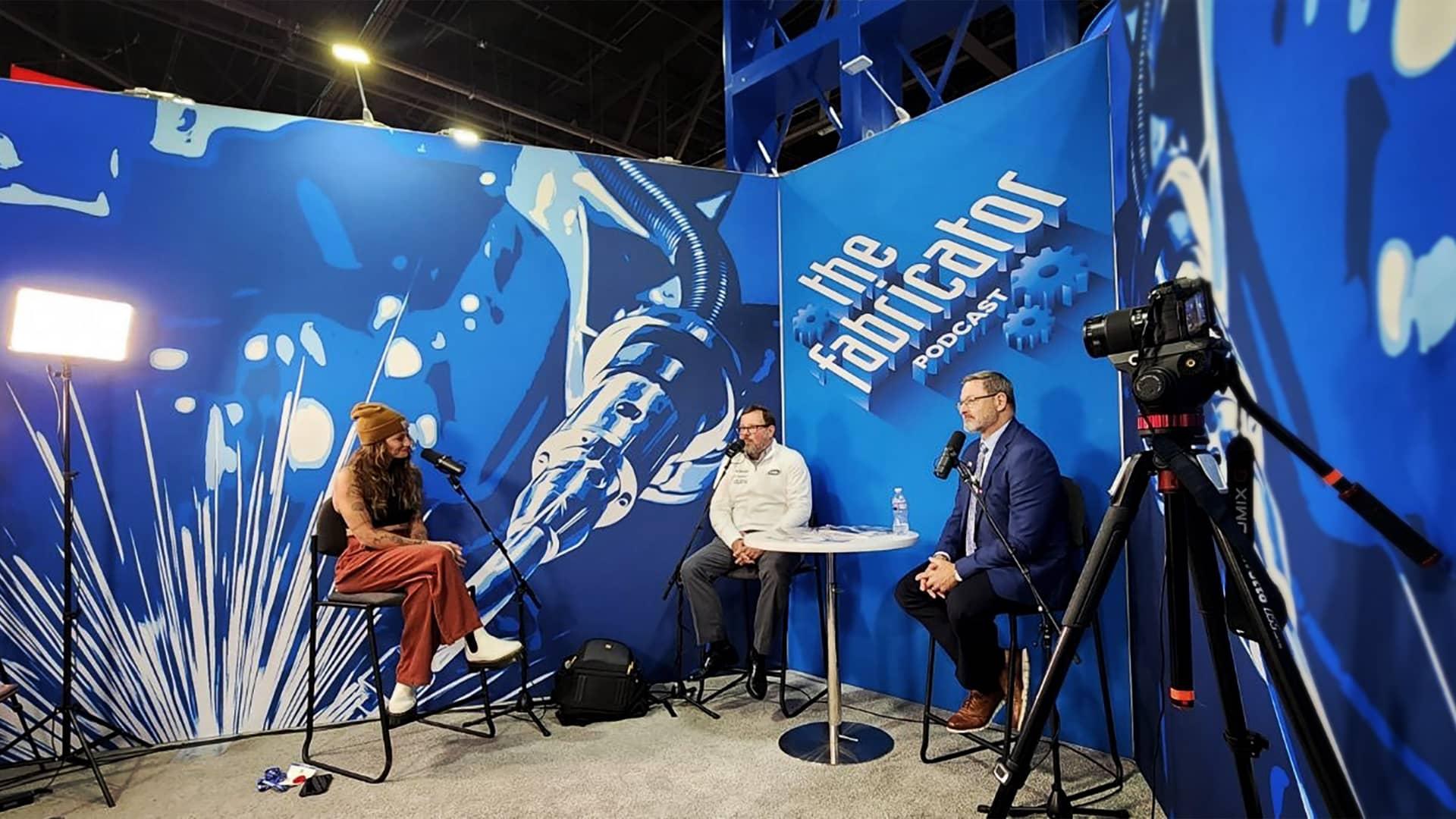
About This Podcast
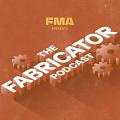
All Episodes
-
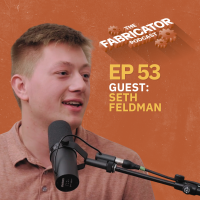 Ep. 053
Ep. 053 -
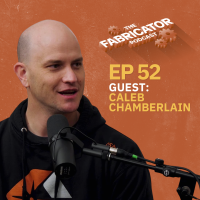 Ep. 052
Ep. 052 -
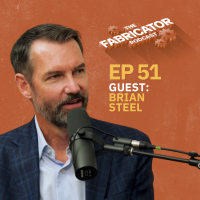 Ep. 051
Ep. 051 -
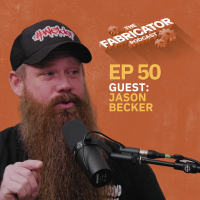 Ep. 050
Ep. 050 -
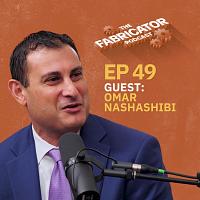 Ep. 049
Ep. 049 -
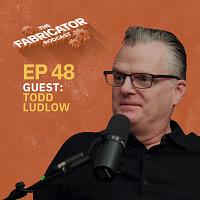 Ep. 048
Ep. 048 -
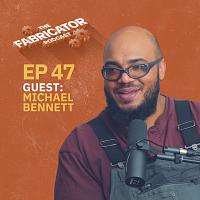 Ep. 047
Ep. 047 -
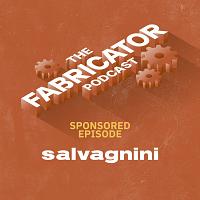 Bonus
Bonus -
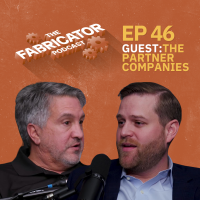 Ep. 046
Ep. 046 -
 Ep. 045
Ep. 045 -
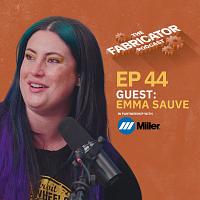 Ep. 044
Ep. 044 -
 Ep. 043
Ep. 043 -
 Ep. 042
Ep. 042 -
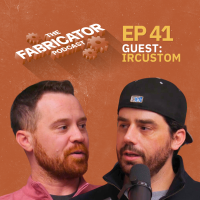 Ep. 041
Ep. 041 -
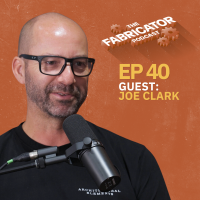 Ep. 040
Ep. 040 -
 Ep. 039
Ep. 039 -
 Ep. 038Winning and fabricating trophies with Tom Patsis of Cold Hard Art
Ep. 038Winning and fabricating trophies with Tom Patsis of Cold Hard Art -
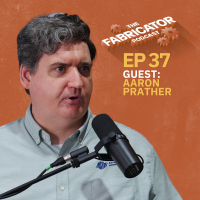 Ep. 037
Ep. 037 -
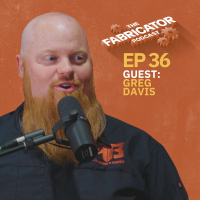 Ep. 036
Ep. 036 -
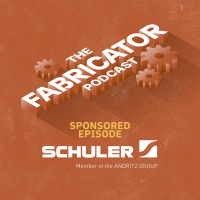 Bonus
Bonus -
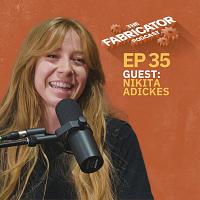 Ep. 035
Ep. 035 -
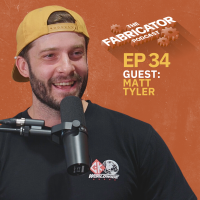 Ep. 034
Ep. 034 -
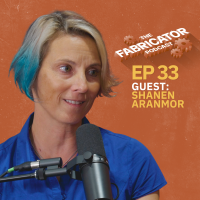 Ep. 033
Ep. 033 -
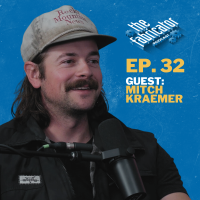 Ep. 032
Ep. 032 -
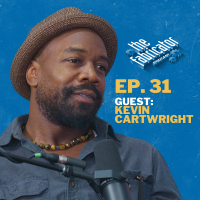 Ep. 031
Ep. 031
























